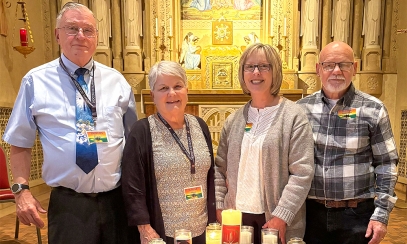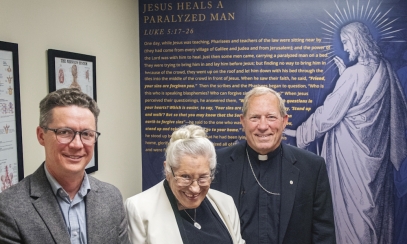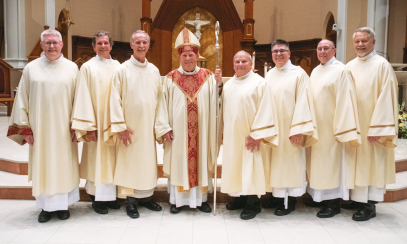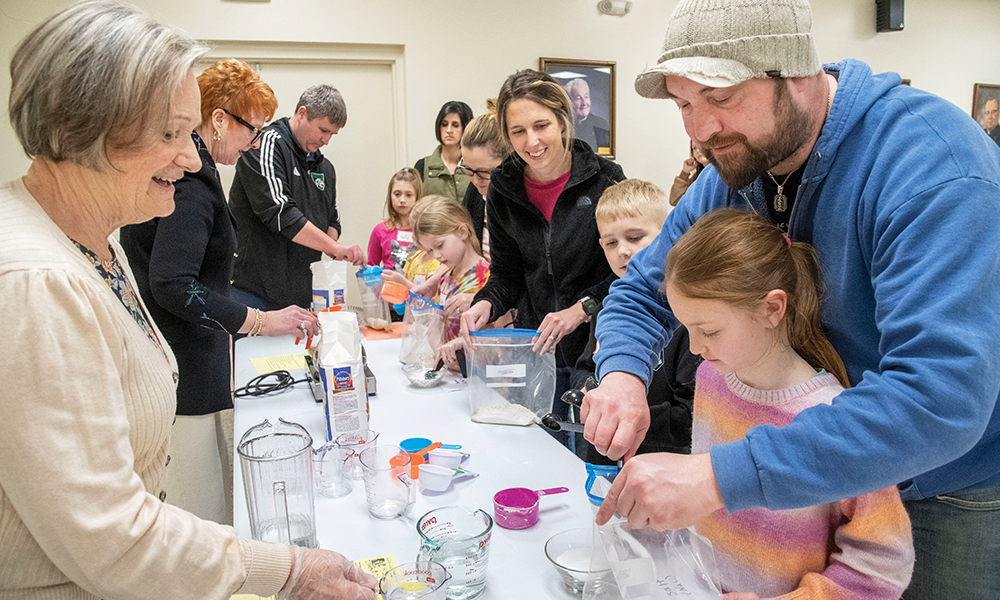
Families Forming Disciples: Reenergized faith formation program in Sanford drawing more young families to Mass
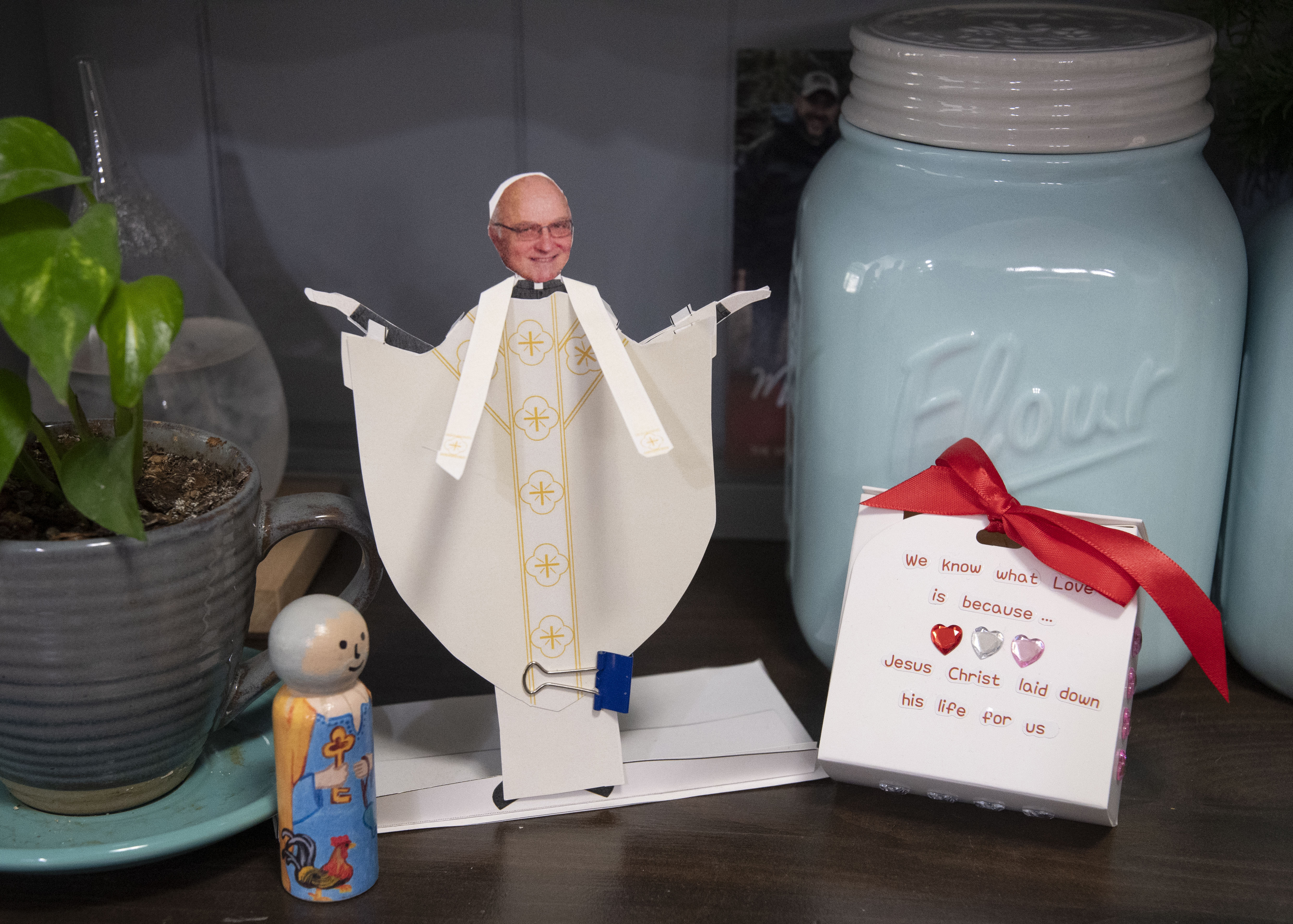 On the Sprague family china cabinet in a well-trafficked spot is a paper doll cutout of Father Dan Fox, OFM Cap. It stands there year-round in a miniature sanctuary in the middle of the kids’ artwork and birthday cards, and though the paper doll version of Father Dan blends in, he is never forgotten. Someone always changes his vestments according to the liturgical season—purple, green, red and white.
On the Sprague family china cabinet in a well-trafficked spot is a paper doll cutout of Father Dan Fox, OFM Cap. It stands there year-round in a miniature sanctuary in the middle of the kids’ artwork and birthday cards, and though the paper doll version of Father Dan blends in, he is never forgotten. Someone always changes his vestments according to the liturgical season—purple, green, red and white.
“I’m like a Ken doll,” Father Dan says, chuckling.
The paper doll Father Dan—complete with his staff photo—is just one of many lighthearted ways that Laura Scheibert has made learning about the Catholic faith fun for children and parents participating in the Families Forming Disciples program at Our Lady of Grace Parish in Sanford.
Taught together and lived together
Now in its third year, the program is a big hit with the families who participate every second Sunday of the month. The class is held between the morning Masses from October until spring. Activities resume in June during Vacation Bible School, while middle and high school students continue to meet for various activities during the summer.
In addition to a catechetical lesson, every class discusses the Gospel, prayer, Catholic traditions, a saint, the liturgical year and a feast day. This year's focus was on the Eucharistic Revival, and the class studied the Mass.
For the three weeks a month that the families do not meet, Laura sends home packets that include catechetical lessons and some fun elements.
“But there is serious work for the families to tackle together,” she adds.
On top of the engaging, hands-on approach of the classes, a big draw is also the breakfast that begins each session. The meal is lovingly prepared and planned by Laura and four parish volunteers—Maryann Hibbard, Kathy Nogalski and Bonnie and Elmer Tappen. After the meal, young kids remain in the parish hall with Laura and their parents for faith formation, while the middle and high school students leave for separate classrooms with youth ministers.
The renewed approach to faith formation—something that Laura likes to refer to as “Intergenerational Catechesis”—was something she had thought about for some time. But when COVID hit, Laura decided to put her idea into practice. As the director of religious education for the past 18 years at the parish, Laura needed to find a way to continue in-person faith formation despite social distancing requirements and a shortage of catechists. So the Families Forming Disciples program—which started out as a temporary solution—has turned into a permanent approach to faith formation at the parish. Now, Laura says she wouldn’t teach faith formation classes any other way.
“It’s taught together, and it’s lived together,” she says.
Strengthening the domestic church
This past year, there were about 40 families— 65 children and 55 adults— regularly participating in the program, Laura says. And though the numbers are still recovering from COVID’s impact, Laura, Father Dan and others credit the program with increasing the number of young families regularly attending Mass.
Parents who attend the classes with their children say the family-centered approach to faith formation in the parish also is inviting more faith-centered conversations at home, on the way to and from Mass and while out and about doing errands. As Laura says, the new approach is designed to strengthen the family—the domestic church—at home.
Renee Lang, a young mother from Beaverton who normally attends with her immediate and extended family, says the classes “normalize” talk about religion at home.
“It makes it very easy and comfortable to talk about religion and God,” she says. “It opens up a lot of discussion that I feel like I didn’t have as a child. … And it’s a good refresher course for us, too.”
“[Laura] really does a great job of including kids and getting them to understand rituals and what they mean,” Renee said. “She breaks it down for the kids to understand. She makes it fun.”
Renee’s 8-year-old daughter Reggie is always an enthusiastic participant, Laura says. Reggie says she is looking forward to receiving her First Holy Communion on May 5, when she will have full communion with Jesus in her new white dress, wearing her aunt Erica Sprague’s wedding veil.
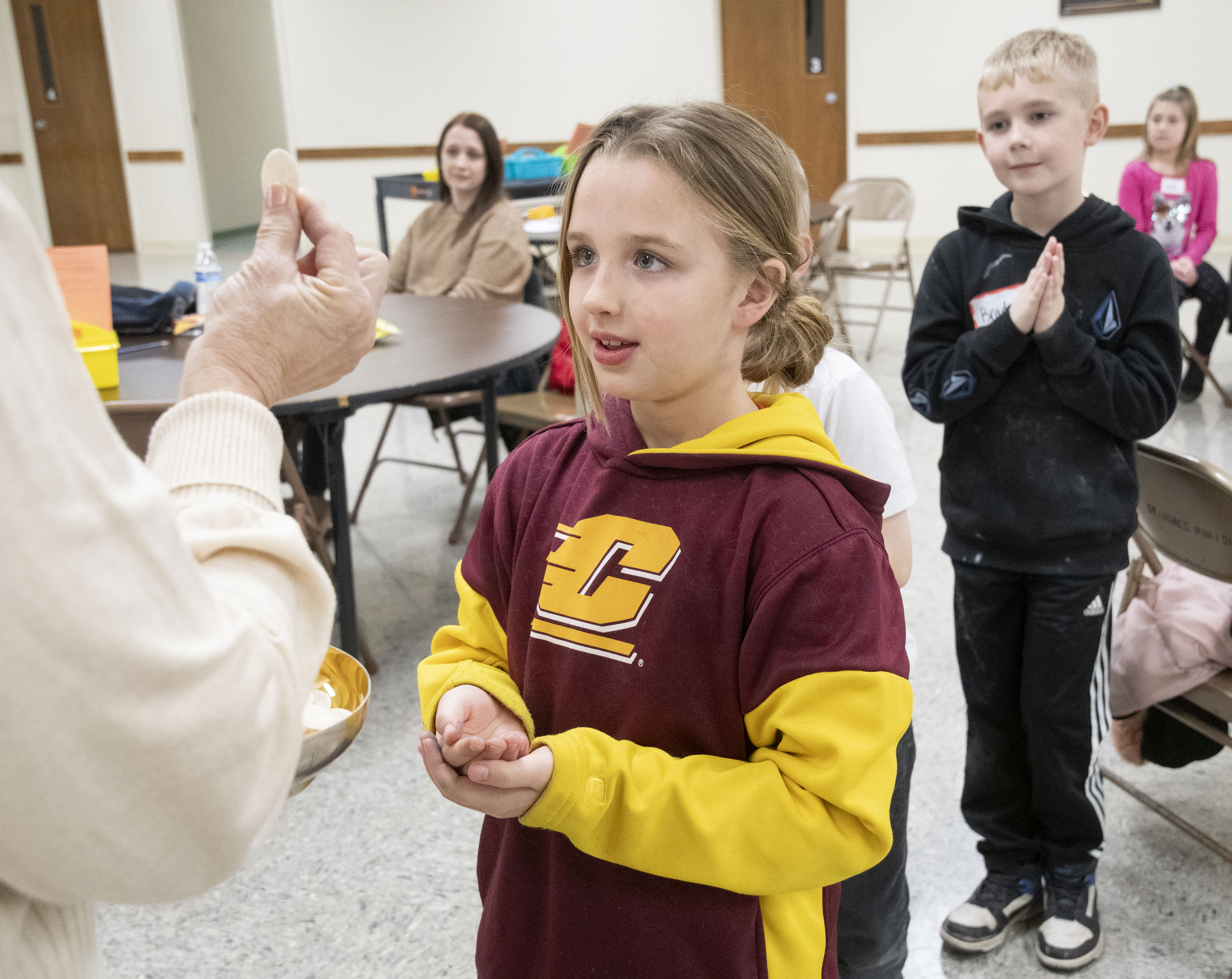 New wineskins and new disciples
New wineskins and new disciples
Reggie is a big fan of the classes, of Laura and of spending time with her immediate and extended family in class.
That opportunity is part of what makes the Families Forming Disciples program so unique. Many religious education classes resemble traditional classroom settings with students divided by grade with a catechist rather than an emphasis on families learning about the faith together. Several parents in the Families Forming Disciples class recall “dry” textbooks for their own faith formation.
The need for a new approach for faith formation was necessary, says Father Dan, who grew up in a Catholic neighborhood on Detroit’s east side as one of 14 children. Now 77 years old, Father Dan recalls knowing everyone on his block, and going to different people’s houses to pray the Rosary.
But times have changed, Father Dan says.
“We have to have a new approach. The world has changed. And if Christ is ever new, then our perspective has to change, doesn’t it? We can’t put new wine into old wineskins,” he said.
Catholic parents are supposed to be the primary catechists for their children, and in Laura’s opinion, the traditional approach to faith formation has been in need of an overhaul for some time.
During her 30 years as a catechist and in the past 18 years in her current position, Laura has found that parents sometimes were not equipped with what they needed to effectively pass on knowledge of the Catholic faith to their children. Many parents were unable to catechize because they themselves were not catechized effectively, says Laura, who also happens to be a member of the Diocese of Saginaw’s Faith Formation Advisory Board.
The bottom line is this: parents are still responsible for their children’s faith formation even when there is a strong program in place at the parish, Father Dan notes.
“The injunction of Jesus at the Ascension is, ‘Go therefore and make disciples of all nations.’ … That’s the role of a disciple. And if the parents are disciples, then this is their call,” he said, quoting Matthew 28:19.
By all appearances, Erica Sprague’s immediate and extended family members are truly living up to the name of the class, Families Forming Disciples. Erica’s family usually takes up two or three tables in the parish hall, often numbering between 10 to 15 people.
Erica, a high school science teacher, her husband Joe, 15-year-old twins Reed and Riley and 11-year-old Daniel all regularly attend the once-a-month classes.
So does Erica’s brother Andy with his children, Ellie (7), Sage (8) and Leo (10). Erica’s other brother Matthew and his wife Renee also regularly attend with their children Josie (3), Reggie (8) and Maggie (9). And then there’s Renee’s sister Kayla and husband Zack with their two boys, Brady (8) and Mason (10). Adding to the family’s full participation is Erica’s mom, Kerry, who often attends as well.
Erica and her family, who live in Beaverton, have attended the Families Forming Disciples program since it started. And it was the strength of the parish’s faith formation program—then with traditional catechism classes for the children—that convinced Erica and her family to join the parish a decade ago.
Now, Erica enjoys sharing the experience of faith formation with her children at the Families Forming Disciples classes. And while Erica’s twin 15-year-old sons, Reed and Riley, may not be as involved in the classes as her younger son Daniel, “they still like being a part of it.” (Reed and Riley already are involved in the life of the parish as altar servers.)
“I think [Daniel] likes having his dad and I there with him the whole time,” Erica notes.
And since Daniel is constantly on the move, Erica says, hands-on activities are much more effective for his learning process than if someone were to simply hand him a worksheet.
Bringing the faith home
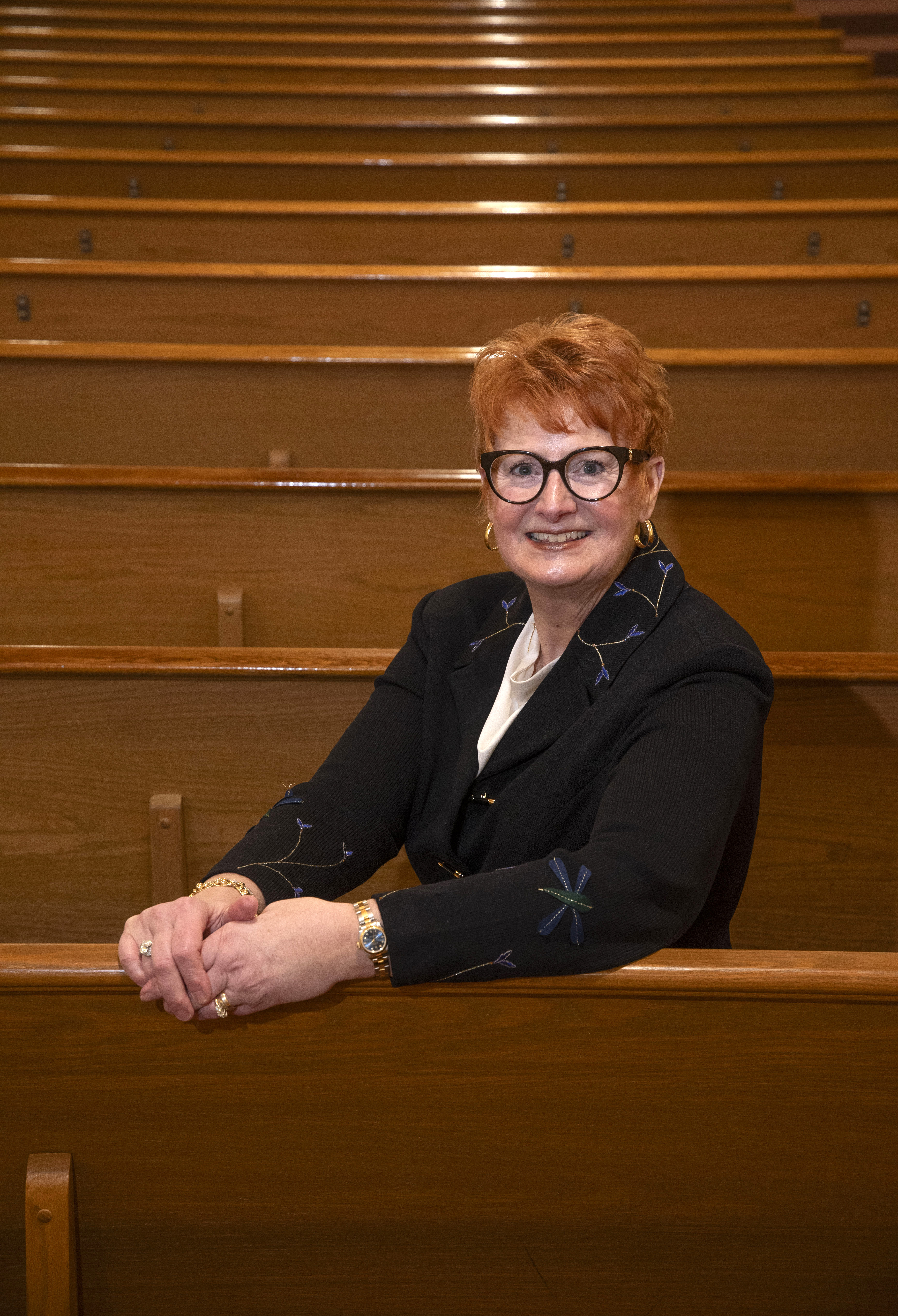
The fun, interesting activities that Laura and volunteer Marabeth Holsinger have for the kids always keep them excited and engaged, Erica says. She particularly enjoys seeing her five nieces, including Reggie, in class.
“They are always excited about what we are going to do,” she said.
The classes are fast-paced, and Laura is always sending home a packet of fun activities for the families to do together, Erica says. A favorite, of course, is the paper doll cutout of Father Dan in his miniature sanctuary. But there also is a drawer full of other items in the Sprague household, including an Advent wreath and rectangular wooden blocks with laminated pictures of saints and information about them that Erica places strategically around the house on appropriate feast days. Sometimes Erica asks her boys to dig out a particular item from the drawer. But it's the visibility of the saint blocks and various items Erica places around the home that often leads to welcome questions and informal educational opportunities.
As a busy mother, Erica also appreciates the cleverly named “Mass Transit” cards that Laura sends home every month in the packets to help prepare the families for the upcoming Gospel readings. She keeps the cards, with readings and thought-provoking questions, in the visor of her minivan for her and the kids to talk about that often lead to “spontaneous” conversations when they’re out and about.
Much like the Sprague household, the paper doll cutout of Father Dan also is a favorite for the Idzior family. So are the saint blocks. And then there’s the liturgical calendar that Emilie Idzior cut out and put together with her children that shows them what color Father Dan’s vestments should be at any given time during the year.
“There’s always something new, something different,” Emilie says.
But in addition to the fun activities, the promise of a delicious breakfast after Mass helps Emilie and her husband David get their four children—Sabine (3), Xavier (5), Kateri (10) and Blaize (11)—out the door of their home a little quicker on Sunday mornings.
This past year was the first that the Idzior family started attending the Families Forming Disciples program.
It's been a great experience for the whole family, Emilie says. The kids “are really excited to go each month” and never let anything get in the way of the Sunday classes. “It’s faith formation day!” the kids say.
It’s “beautiful” to see the kids so fired up and excited to go to church, she says. And even though Catholic parents are called to be the primary educators when it comes to childrens’ faith, “it’s great to have a faith formation leader reiterating it.”
“We feel supported as parents trying to raise our children,” Emilie says.
Laura keeps the class interesting for the children and parents, says Marabeth, who regularly volunteers and happily snaps pictures during each class.
“She keeps it hopping … They’re engaged,” Marabeth says. “It’s a pleasure to see them so involved and so happy.”
One popular recent activity for parents and children was making a catapult using a tongue depressor and a sheep at the end, sitting in a bottle cap. The lesson focused on the dismissal at the end of Mass, when the priest says, ‘Go and announce the Gospel of the Lord.’
This sending forth is basically “catapulting” the flock out into the world, Laura said.
“I refer to [the children] as the flock—they are Jesus’ sheep,” she explained, adding that she tries to include fun visuals for the kids, and they know they are the sheep.
The lesson of proclaiming the Gospel has definitely taken root with Reggie. A fan of Vacation Bible School, she has invited some of her non-Catholic friends at school to join her. And she’s quick to add that when friends spend the night, “they come to church with us” the next day.
Faith, family and fun
During the final class before their First Holy Communion, Reggie, her classmates and their families filled the parish hall. After a simple meal together, the children gleefully squished bread dough in a bag. Laura explained to the children that Catholics believe that the bread and wine truly and fully become the Body, Blood, Soul and Divinity of Christ when the priest consecrates them during Mass.
The class concluded with the children lining up as if they were already at their First Communion. But for practice, they received unconsecrated hosts and juice. Then, as they prepared to leave the parish hall, Laura also gave them something else to look forward to: a scavenger hunt around the church on April 21, the day of the First Communicant Family Feast.
Reggie says she has enjoyed most of the activities in class, especially making tie-dye Families Forming Disciples T-shirts at the beginning of the school year.
But more than all the activities combined, Reggie says: “I like to learn and spend time with my family.”
Laura is quick to point out that she is simply the catalyst for the family formation, whether she’s leading the class in saint bingo or sending parents home with a packet of fun, hands-on materials to work on, play with, and discuss as a family. Like the “Go Fish” deck of cards with saints on the back, the paper doll priest with Father Dan’s head on it, the saint blocks or any number of other activities and reading materials she sends home with the families.
“I’m not teaching as much as the parents are teaching,” Laura says, adding she gives everyone at the class materials to talk about as a family outside the classes. “They do the work, I just feed it to them.”
But beyond making learning about the Catholic faith fun for families, Laura says, it’s about making disciples. It’s about keeping faith alive in the Church.
“The beauty of family-centered faith formation is building the domestic church and giving the families faith to take home,” Laura says. “It helps [children] grow and lock into their faith for life. … If they fall in love with the faith when they’re young, you won’t have to worry about them leaving when they’re older.”

